【备战2014,教师原创】2014年高考英语语法备考 分词 课件
文档属性
| 名称 | 【备战2014,教师原创】2014年高考英语语法备考 分词 课件 |

|
|
| 格式 | zip | ||
| 文件大小 | 1.1MB | ||
| 资源类型 | 教案 | ||
| 版本资源 | 通用版 | ||
| 科目 | 英语 | ||
| 更新时间 | 2014-03-23 00:00:00 | ||
图片预览

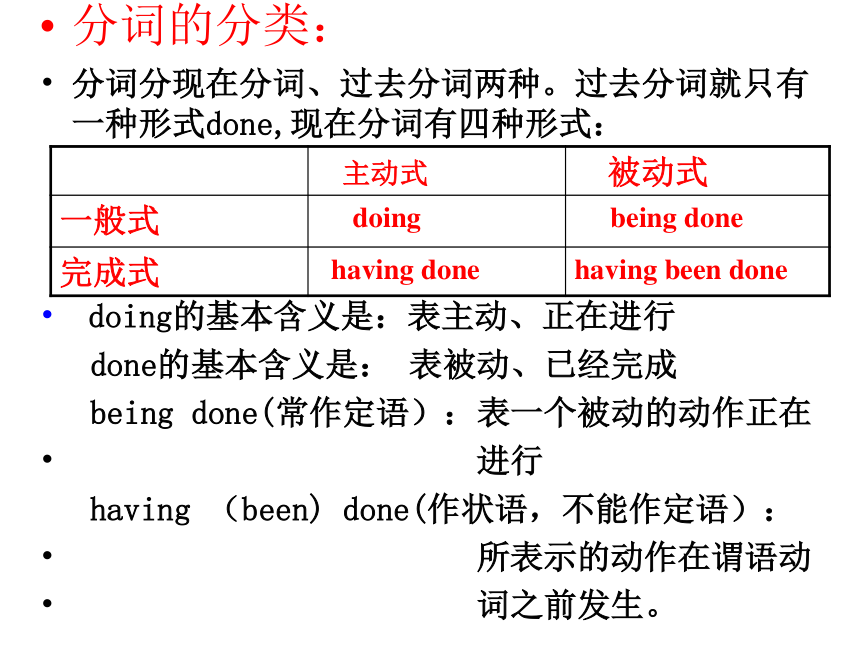
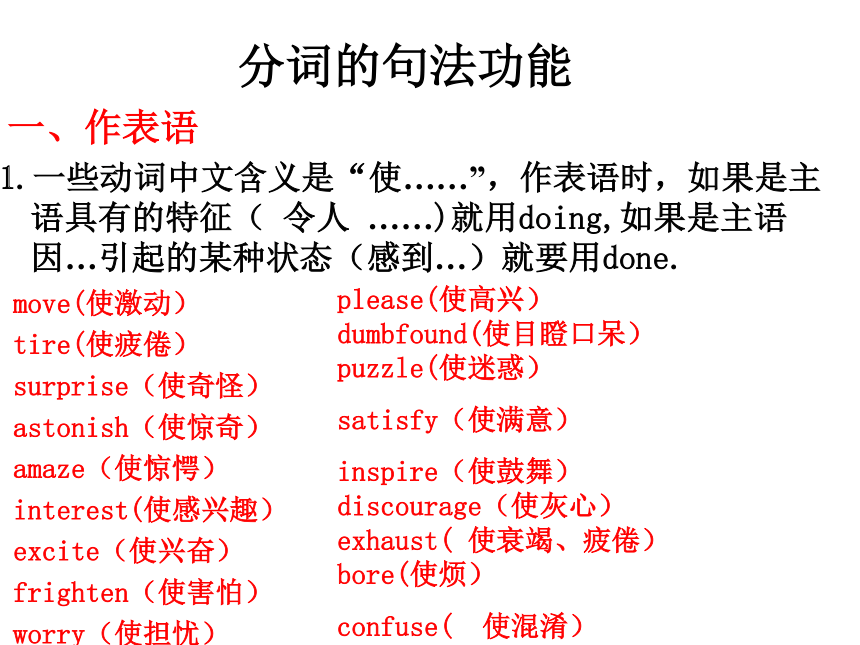
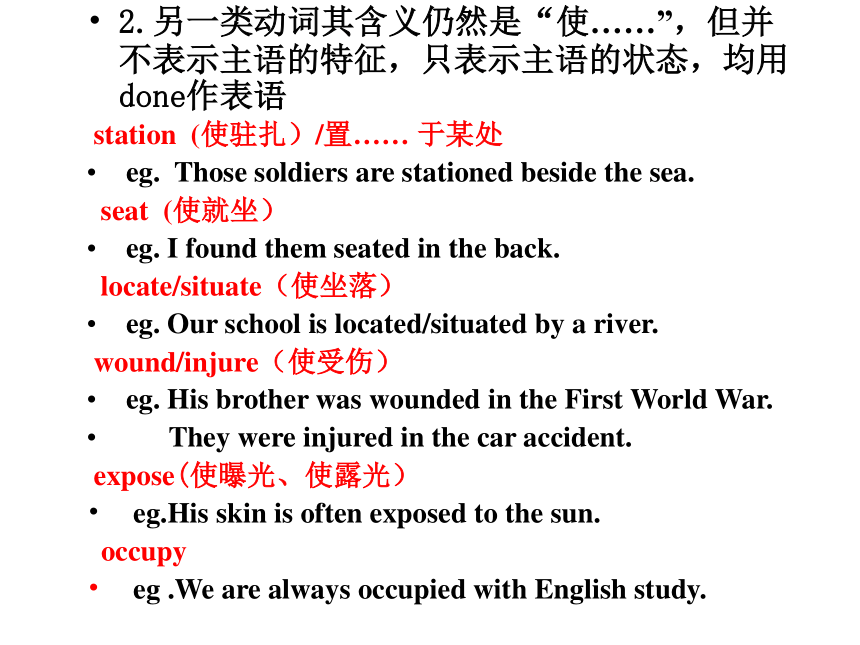
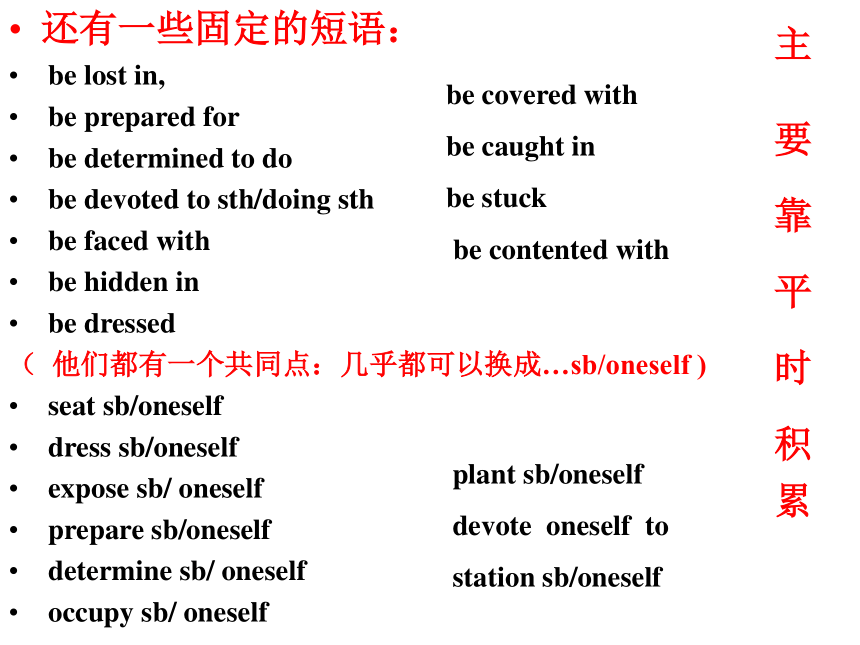
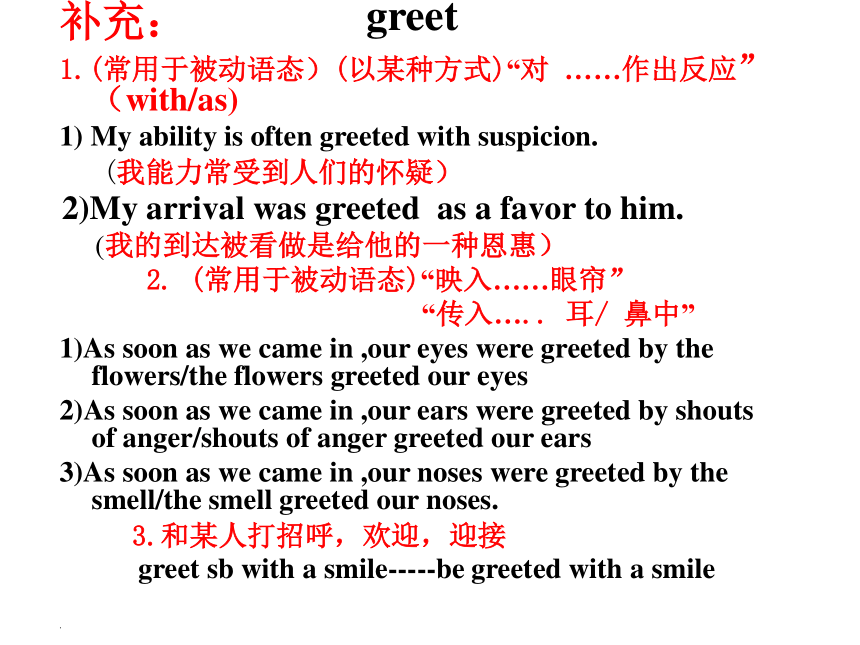
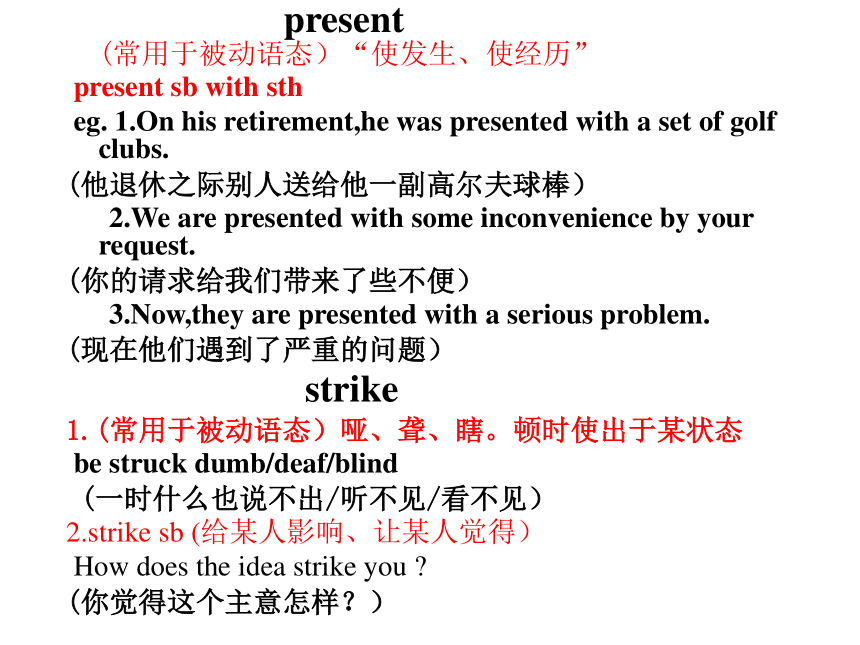
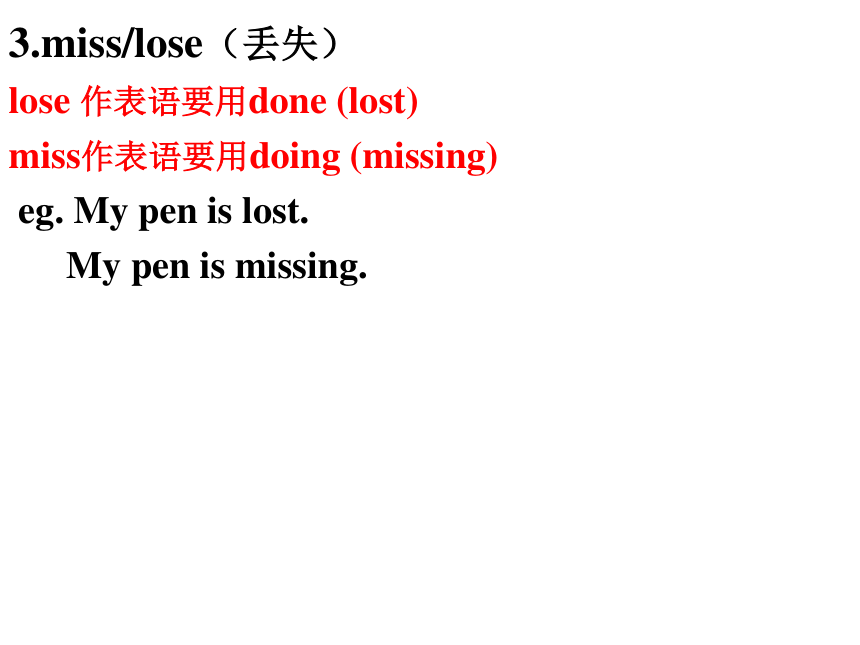
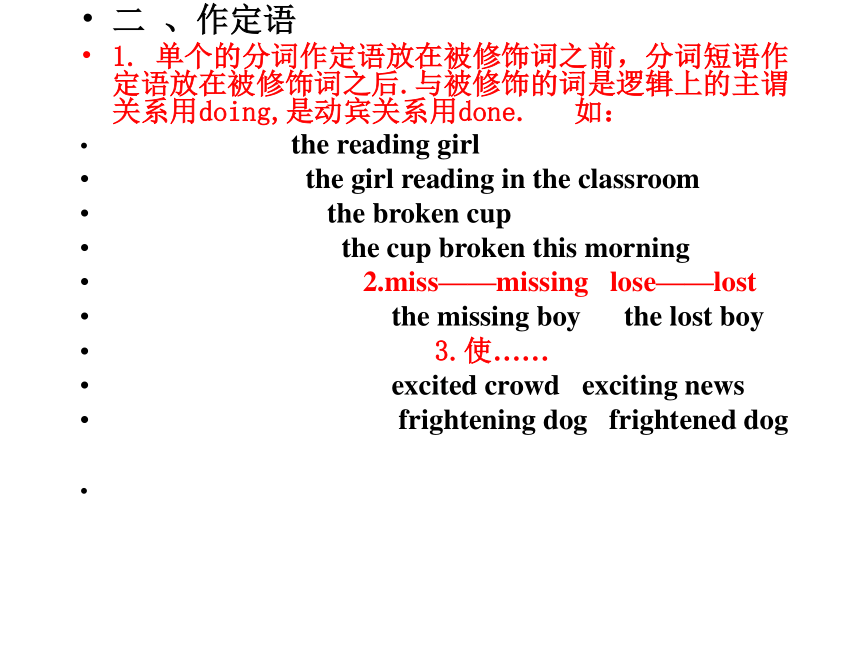

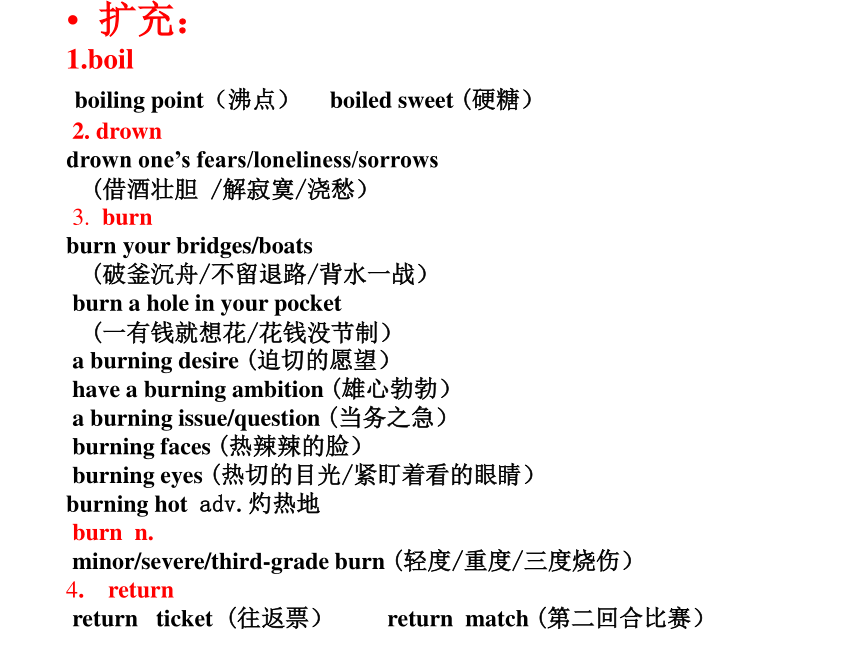
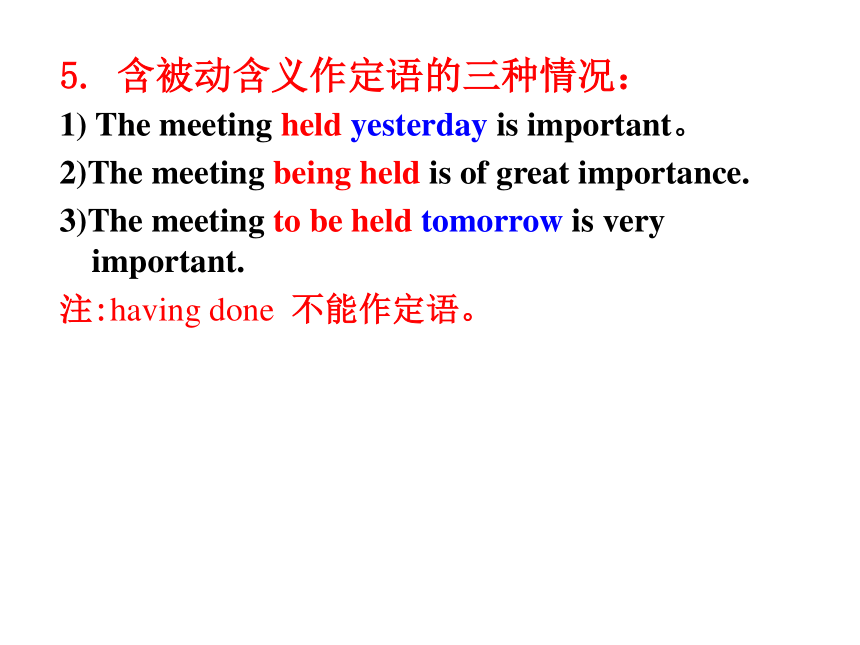
文档简介
课件39张PPT。分
词
分词的分类:
分词分现在分词、过去分词两种。过去分词就只有一种形式done,现在分词有四种形式:
doing的基本含义是:表主动、正在进行
done的基本含义是: 表被动、已经完成
being done(常作定语):表一个被动的动作正在
进行
having (been) done(作状语,不能作定语):
所表示的动作在谓语动
词之前发生。
分词的句法功能
一、作表语
1.一些动词中文含义是“使……”,作表语时,如果是主语具有的特征( 令人 ……)就用doing,如果是主语因…引起的某种状态(感到…)就要用done.
move(使激动)
tire(使疲倦)
surprise(使奇怪)
astonish(使惊奇)
amaze(使惊愕)
interest(使感兴趣)
excite(使兴奋)
frighten(使害怕)
worry(使担忧) please(使高兴) dumbfound(使目瞪口呆)puzzle(使迷惑)
satisfy(使满意)
inspire(使鼓舞) discourage(使灰心)exhaust( 使衰竭、疲倦)bore(使烦)
confuse( 使混淆)
2.另一类动词其含义仍然是“使……”,但并不表示主语的特征,只表示主语的状态,均用done作表语
station (使驻扎)/置…… 于某处
eg. Those soldiers are stationed beside the sea.
seat (使就坐)
eg. I found them seated in the back.
locate/situate(使坐落)
eg. Our school is located/situated by a river.
wound/injure(使受伤)
eg. His brother was wounded in the First World War.
They were injured in the car accident.
expose(使曝光、使露光)
eg.His skin is often exposed to the sun.
occupy
eg .We are always occupied with English study.
还有一些固定的短语:
be lost in,
be prepared for
be determined to do
be devoted to sth/doing sth
be faced with
be hidden in
be dressed
( 他们都有一个共同点:几乎都可以换成…sb/oneself )
seat sb/oneself
dress sb/oneself
expose sb/ oneself
prepare sb/oneself
determine sb/ oneself
occupy sb/ oneself
be covered with
be caught in
be stuck
be contented with
plant sb/oneself
devote oneself to
station sb/oneself主 要 靠 平 时 积 累 补充:
1.(常用于被动语态)(以某种方式)“对 ……作出反应”(with/as)
1) My ability is often greeted with suspicion.
(我能力常受到人们的怀疑)
2)My arrival was greeted as a favor to him.
(我的到达被看做是给他的一种恩惠)
2. (常用于被动语态)“映入……眼帘”
“传入….. 耳/ 鼻中”
1)As soon as we came in ,our eyes were greeted by the flowers/the flowers greeted our eyes
2)As soon as we came in ,our ears were greeted by shouts of anger/shouts of anger greeted our ears
3)As soon as we came in ,our noses were greeted by the smell/the smell greeted our noses.
3.和某人打招呼,欢迎,迎接
greet sb with a smile-----be greeted with a smile
.
greet present (常用于被动语态)“使发生、使经历”
present sb with sth
eg. 1.On his retirement,he was presented with a set of golf clubs.
(他退休之际别人送给他一副高尔夫球棒)
2.We are presented with some inconvenience by your request.
(你的请求给我们带来了些不便)
3.Now,they are presented with a serious problem.
(现在他们遇到了严重的问题)
strike
1.(常用于被动语态)哑、聋、瞎。顿时使出于某状态
be struck dumb/deaf/blind
(一时什么也说不出/听不见/看不见)
2.strike sb (给某人影响、让某人觉得)
How does the idea strike you ?
(你觉得这个主意怎样?)
3.miss/lose(丢失)
lose 作表语要用done (lost)
miss作表语要用doing (missing)
eg. My pen is lost.
My pen is missing.二 、作定语
1. 单个的分词作定语放在被修饰词之前,分词短语作定语放在被修饰词之后.与被修饰的词是逻辑上的主谓关系用doing,是动宾关系用done. 如:
the reading girl
the girl reading in the classroom
the broken cup
the cup broken this morning
2.miss——missing lose——lost
the missing boy the lost boy
3.使……
excited crowd exciting news
frightening dog frightened dog
4.有些不及物动词doing表动作正在进行,done表动作已经完成。
boiling water (正在开的水)
boiled water (开过的水)
falling leaves (往下掉的叶)
fallen leaves(落地的叶)
rising sun(初升的太阳)
risen sun(升起的太阳)
developing country(发展中国家)
developed country(发达国家)
changing Enshi(变化中的恩施)
changed Enshi(变化了的恩施)
the burning sun(灼热的太阳)
burned toast(烤焦的面包片)
drowning boy (溺水的男孩)
drowned rat(落汤鸡)
returning professor(回途中的教授)
returned professor ( 回来了的教授)
扩充:
1.boil
boiling point(沸点) boiled sweet (硬糖)
2. drown
drown one’s fears/loneliness/sorrows
(借酒壮胆 /解寂寞/浇愁)
3. burn
burn your bridges/boats
(破釜沉舟/不留退路/背水一战)
burn a hole in your pocket
(一有钱就想花/花钱没节制)
a burning desire (迫切的愿望)
have a burning ambition (雄心勃勃)
a burning issue/question (当务之急)
burning faces (热辣辣的脸)
burning eyes (热切的目光/紧盯着看的眼睛)
burning hot adv.灼热地
burn n.
minor/severe/third-grade burn (轻度/重度/三度烧伤)
4. return
return ticket (往返票) return match (第二回合比赛)5. 含被动含义作定语的三种情况:
1) The meeting held yesterday is important。
2)The meeting being held is of great importance.
3)The meeting to be held tomorrow is very important.
注:having done 不能作定语。6.与面部表情有关的名词
通常只能用done作定语
1) satisfied smile
2)worried expression
3)pleased look
4)puzzled expression
7.两种形式过去分词的不同用法:
1)light(lighted-lighted/lit-lit)
作定语时只能用lighted
2)rot(rotted-rotted/rotted-rotten)
作定语时只能用rotten
3)drink(drank-drunk/drank-drunken)
drunken只能作定语
4)strike(struck-struck/struck-striken)
构成合成词只能用 stricken
5)learn(learned-learned/learnt-learnt)
6)hang(hanged-hanged/hung-hung)
7)lie(lied-lied/lay-lain)
8.spell(spelled-spelled/spelt-spelt)
a misspelt word
9.spoil(spoiled-spoiled/spoilt/spoilt)(娇惯,宠坏)
a spoilt child
10.burn(burned_burned/burnt_burnt)
burnt(烧坏的,烧伤的,烫伤的)
一般来说:用不规则那个作定语。
特例:a learned man
a lighted candle
三、作宾语补足语
1.宾语和宾语补足语之间是逻辑上的主谓关系用doing,逻辑上的动宾关系用done.
I found the teacher surrounded in the room.
I found the teacher sitting in the room.
2.miss _ missing lose__ lost
He found his book missing/lost.
3.sit/seat/seat oneself
As soon as I came into the classroom, I found the villagers sitting
seated in the room.
seating themselves
4. 一些固定的句型
1)see sb do 看见某人做某事(动作经常性
或已经完成)
see sb doing 看见某人在做某事(动作正
在进行)
see sb done 看见某人被……(动作经常性
或已经完成)
2)hear sb do 听见某人做某事(动作经常性或已
经完成)
hear sb doing 听见某人在做某事(动作正在
进行)
hear sb done 听见某人被……(动作经常性或
已经完成)
3) have sb do sth
get sb to do sth
(叫某人做某事)
4)have sb do sth
have sth done/get sth done
(叫某人做某事)
5) have sb do sth(叫某人做某事)
have sb doing (叫某人在做某事)
(not)have sb doing (不容许某人做某事)
have sb done
I must have her sent to the hospital.
6)have sth done /get sth done
have sth doing
eg. a. Don’t have the lights burning all night
long.
b. He had the tractor working a long time.
7) get sb to do sth
get sb doing
8) get sth done (请某人做某事)
get sth doing (设法让某事……)
eg. Finally he got the car starting.
Finally he got the car started.
9)have sth done
10) leave sb to do sth (叫/ 留下某人做某事)
leave sb doing (让某人处于做某事的状态)
leave sth to be done(留下某事要做)(动词不定
式表将来的动作)
leave sth undone (留下某事未做)
unfinished
untouched
unsettled
11)keep sb doing (让某人老是做某事)
keep sb done
(常考点:keep sb informed of sth) 12) send sb to do sth
派(遣)某人去做某事
send sb doing
eg .A.The sound of the gun sent the birds flying
in every direction.
B. The big fire sent the people escaping from
the building.四、作状语
分词作状语时其逻辑主语必须是句子的主语,与句子主语是逻辑上的主谓关系用doing,是动宾关系用done.
doing 所表示的动作与句子谓语同时发生或者几乎同时发生,having done所表示的动作在谓语动词之前发生。
1.As soon as he finished his homework, he went to bed.
Finishing his homework, he went to bed.
2.After he finished his homework, he went to bed.
Having finished his homework, he went to bed.
3.If I have enough money ,I will buy a car.
Having enough money ,I will buy a car.
4.They went out of the classroom and left the door open.
They went out of the classroom ,leaving the door open.
5. We came into the classroom and talked and laughed all the way.
We came into the classroom, talking and laughing.
更多的例句:
6.He came late again ,which made the teacher unhappy.
He came late again, making the teacher unhappy.
7. They sat there ,reading.
8. Doing in a hurry, I made many mistakes.
9.Done in a hurry, my exercise was full of mistakes.
10. Coming into the classroom ,I found the flower.
11.Uninvited,they came, though.独立主格
分词作状语时其逻辑主语必须是句子的主语。如果不是就要带上分词自己的逻辑主语,就构成了独立主格。
1).As soon as my homework was finished,I went to bed.
My homework finished,I went to bed.
2).After my homework was finished,I went to bed.
My my homework having been finished,I went to bed.
3)When the guest came in ,they were watching TV.
The guest coming in, they were watching TV
4)After the guestes took their seats ,the match began.
The guestes having taken their seats ,the match began
5)This is my first book and the second will be published next year.
This is my first book,the second to be published next year
6)If it is fine tomorrow,they will go.
It being fine tomorrow,they will go.
With的复合结构固定的用法:
1.assuming
2.suppose/supposing
3.provide/providing
4.considering(鉴于,考虑到)
5.compared to/with
6.judging from/by
7. taken as a whole
8.generally speaking,...
9.take …for granted
10.including…/…included
11.given that (如果有,假定有)
12. granted/granting that(就算,假定)
“迷路”的几种表达法:
1. be lost
2.lose one’s way
3.lose oneself
4.get lost
如果是在状语的位置上分别表达为:
lost
losing one’s way
losing oneself
getting lost
通过大量的练习我们发现:只要是由be +done构成的短语,在作句子状语、定语、补足语的时候,均去掉be
eg. be caught in be devoted to
be determined to do be loaded with
be dressed be seated
历年高考题1. The speaker raised his voice but still couldn’t make himself____ . (NMET91 34)
A.hear B. to hear C. hearing D. heard 2. On afternoon, Mrs Green went to the market, ____ some bananas and visited her cousin. (NMET91 23)
A. bought B. buying C. to buy D. writing 3. --I usually go there by train.
--Why not ____ by boat for a change? (NMET92 14)
A. to try going B. trying to go C. to try and go D. try going 4. ____ a reply, he decided to write again. (MET92 39)
A. Not receiving B. Receiving not
C. Not having received D. Having not received5. How about the two of us ____ a walk down the garden? (MET93 17)
A. to take B. take C. taking D. to be taking 6. ____ down the radio ---- the baby’s asleep in the next room.
(MET93 24)
A. Turning B. To turn C. Turned D. Turn 7. Charles Babbage is generally considered ____ the first computer.
(MET93 34) A. to invent B. inventing C. to have invented D. having invented ??8. ---I must apologize for ____ ahead of time.
---That’s all right. (MET94 21)
A. letting you not know B. not letting you know
C. letting you know not D. letting not you know 9. Rather than ___ on a crowded bus, he always prefers ____ a bicycle. (NMET94 22)
A. ride; ride B. riding; ride C. ride; to ride D. to ride; riding 10. The missing boys were last seen ____ near the river.(NMET94 25)
A. playing B. to be playing C. play D. to play 11. The first textbooks ____ for teaching English as a foreign language came out in the 16th century. (NMET94 34)
A.having written B. to be written C. being written D. written 12. ---You were brave enough to raise objections at the meeting.
---Well, now I regret_ ____ that. (NMET95 26)
A. to do b. to be doing C. to have done D. having done 13. The boy wanted to ride his bicycle in the street, but his mother told
him_____. (NMET95 35)
A. not to B. not to do C. not do it D. do not to 14. ---What do you think made Mary so upset?
---____ her new bicycle. (97上海 13)
A. As she lost B. Lost C. Losing D. Because of losing 15. She can’t help ____ the house because she’s busy making a cake.
(97 上海12)
A. to clean B. cleaning C. cleaned D. being cleaned 16. She looks forward every spring to _____ the flower-lined garden.
?? (95 上海20)
A. visit B. paying a visit C. walk in D. walking in 17. While shopping, people sometime can’t help ____ into buying
something they don’t really need. (96上海14)
A. to pursue B. persuading C. being persuaded D. be persuaded 18. The purpose of new technologies is to make life easier, ____ it more difficult. (NMET99 21)
A. not make B. not to make C. not making D. do not make 19. A computer does only what thinking people _____. (99上海19)
A. have it do B. have it done C. have done it D. having it done20. When I got back home I saw a message pinned to the door ____
“Sorry to miss you; will call later.” (NMET99 25)
A. read B. reads C. to read D. reading5.Mrs.Smith warned her husband_____after drinking again
and again.
A.never to drive B.to never drive C.never driving D.never drive6. To master a foreign language,______.
A. a lot of practice is needed B. it needs a lot of practice
C. practice is in need of D. one needs a lot of practice 20. The library needs ______,but it’ll have to wait until Sunday.
A. cleaning B. be cleaned C. clean D. being cleaned4.Our father often told us in the past that _____is believing.
A.to see B.seeing C.see D.to be seen1.He gave us some advice on how____ English.
A.learning B. learned C. to learn D. learn2. It ’s a pay day,and they are waiting____.
A. pay B. paying C. paid D. to be paid3. --- A letter may be too slow.
---- Why not ____ a telegram.
A.try sending B.try to send C.to try sending D.trying to send巩固练习CDABAD1._____is a good of exercise for both the young and the old.
A.The walk B.Walking C.To walk D.Walk2.When and where to build the new power station______yet.
A.is not decided B.are not decided
C.has not decided D.have not decided3.Is______necessary to change trains at Beijing?
A. this B. that C. it D. he4.Our father often told us in the past that _____is believing.
A.to see B.seeing C.see D.to be seen5.She pretended____the letter I wrote the day before yesterday.
A.not to receive B.not receiving
C.not to hear from D.having not received6.I can’t imagine_____that with such a famous author.
A.work B.to work C.to be working D.workingNon-infinitive 7.She reached the top of the hill and stopped_____on a big rock by the side of the path.
A.to have rested B.resting C.to rest D.rest8.Do you consider___any good attempting many scientific experiments?
A.there B.it C.this D.that9.I’m thirsty. Would you please give me something________.
A.drunk B.to drink C.to be drunk D.for drinking10.There was a terrible noise_______the sudden burst of light.
A.followed B.following C.to be followed D.being followed11.Mrs.Smith warned her husband_____after drinking again
and again.
A.never to drive B.to never drive
C.never driving D.never rive12.They knew her very well.They had seen her____up from childhood.
A.grow B.grew C.was growing D.to grow13. Believe it or not, he was seen______upstairs just now.
A.to go B.to going C.having gone D.go14.It was so cold that they kept the fire ____all night.
A. to burn B. burn C. burning D. burned15.The murderer was brought in ,with his hands _behind his back.
A. being tied B. having tied C. to be tied D. tied16.To master a foreign language,______.
A. a lot of practice is needed B. it needs a lot of practice
C. practice is in need of D. one needs a lot of practice17._________a reply, he decided to write a sixth letter.
A. Not receiving B. Not to receive
C. Not having received D. Having not received18. Little Jim should love _____to the theatre this evening.
A. to be taken B. to take C. being taken D. taking19. —What do you think of the book?
—Oh, excellent. It’s worth ______a second time.
A. to read B. to be read C. reading D. being read20. The library needs ______,but it’ll have to wait until Sunday.
A. cleaning B. be cleaned C. clean D. being cleanedThank you
词
分词的分类:
分词分现在分词、过去分词两种。过去分词就只有一种形式done,现在分词有四种形式:
doing的基本含义是:表主动、正在进行
done的基本含义是: 表被动、已经完成
being done(常作定语):表一个被动的动作正在
进行
having (been) done(作状语,不能作定语):
所表示的动作在谓语动
词之前发生。
分词的句法功能
一、作表语
1.一些动词中文含义是“使……”,作表语时,如果是主语具有的特征( 令人 ……)就用doing,如果是主语因…引起的某种状态(感到…)就要用done.
move(使激动)
tire(使疲倦)
surprise(使奇怪)
astonish(使惊奇)
amaze(使惊愕)
interest(使感兴趣)
excite(使兴奋)
frighten(使害怕)
worry(使担忧) please(使高兴) dumbfound(使目瞪口呆)puzzle(使迷惑)
satisfy(使满意)
inspire(使鼓舞) discourage(使灰心)exhaust( 使衰竭、疲倦)bore(使烦)
confuse( 使混淆)
2.另一类动词其含义仍然是“使……”,但并不表示主语的特征,只表示主语的状态,均用done作表语
station (使驻扎)/置…… 于某处
eg. Those soldiers are stationed beside the sea.
seat (使就坐)
eg. I found them seated in the back.
locate/situate(使坐落)
eg. Our school is located/situated by a river.
wound/injure(使受伤)
eg. His brother was wounded in the First World War.
They were injured in the car accident.
expose(使曝光、使露光)
eg.His skin is often exposed to the sun.
occupy
eg .We are always occupied with English study.
还有一些固定的短语:
be lost in,
be prepared for
be determined to do
be devoted to sth/doing sth
be faced with
be hidden in
be dressed
( 他们都有一个共同点:几乎都可以换成…sb/oneself )
seat sb/oneself
dress sb/oneself
expose sb/ oneself
prepare sb/oneself
determine sb/ oneself
occupy sb/ oneself
be covered with
be caught in
be stuck
be contented with
plant sb/oneself
devote oneself to
station sb/oneself主 要 靠 平 时 积 累 补充:
1.(常用于被动语态)(以某种方式)“对 ……作出反应”(with/as)
1) My ability is often greeted with suspicion.
(我能力常受到人们的怀疑)
2)My arrival was greeted as a favor to him.
(我的到达被看做是给他的一种恩惠)
2. (常用于被动语态)“映入……眼帘”
“传入….. 耳/ 鼻中”
1)As soon as we came in ,our eyes were greeted by the flowers/the flowers greeted our eyes
2)As soon as we came in ,our ears were greeted by shouts of anger/shouts of anger greeted our ears
3)As soon as we came in ,our noses were greeted by the smell/the smell greeted our noses.
3.和某人打招呼,欢迎,迎接
greet sb with a smile-----be greeted with a smile
.
greet present (常用于被动语态)“使发生、使经历”
present sb with sth
eg. 1.On his retirement,he was presented with a set of golf clubs.
(他退休之际别人送给他一副高尔夫球棒)
2.We are presented with some inconvenience by your request.
(你的请求给我们带来了些不便)
3.Now,they are presented with a serious problem.
(现在他们遇到了严重的问题)
strike
1.(常用于被动语态)哑、聋、瞎。顿时使出于某状态
be struck dumb/deaf/blind
(一时什么也说不出/听不见/看不见)
2.strike sb (给某人影响、让某人觉得)
How does the idea strike you ?
(你觉得这个主意怎样?)
3.miss/lose(丢失)
lose 作表语要用done (lost)
miss作表语要用doing (missing)
eg. My pen is lost.
My pen is missing.二 、作定语
1. 单个的分词作定语放在被修饰词之前,分词短语作定语放在被修饰词之后.与被修饰的词是逻辑上的主谓关系用doing,是动宾关系用done. 如:
the reading girl
the girl reading in the classroom
the broken cup
the cup broken this morning
2.miss——missing lose——lost
the missing boy the lost boy
3.使……
excited crowd exciting news
frightening dog frightened dog
4.有些不及物动词doing表动作正在进行,done表动作已经完成。
boiling water (正在开的水)
boiled water (开过的水)
falling leaves (往下掉的叶)
fallen leaves(落地的叶)
rising sun(初升的太阳)
risen sun(升起的太阳)
developing country(发展中国家)
developed country(发达国家)
changing Enshi(变化中的恩施)
changed Enshi(变化了的恩施)
the burning sun(灼热的太阳)
burned toast(烤焦的面包片)
drowning boy (溺水的男孩)
drowned rat(落汤鸡)
returning professor(回途中的教授)
returned professor ( 回来了的教授)
扩充:
1.boil
boiling point(沸点) boiled sweet (硬糖)
2. drown
drown one’s fears/loneliness/sorrows
(借酒壮胆 /解寂寞/浇愁)
3. burn
burn your bridges/boats
(破釜沉舟/不留退路/背水一战)
burn a hole in your pocket
(一有钱就想花/花钱没节制)
a burning desire (迫切的愿望)
have a burning ambition (雄心勃勃)
a burning issue/question (当务之急)
burning faces (热辣辣的脸)
burning eyes (热切的目光/紧盯着看的眼睛)
burning hot adv.灼热地
burn n.
minor/severe/third-grade burn (轻度/重度/三度烧伤)
4. return
return ticket (往返票) return match (第二回合比赛)5. 含被动含义作定语的三种情况:
1) The meeting held yesterday is important。
2)The meeting being held is of great importance.
3)The meeting to be held tomorrow is very important.
注:having done 不能作定语。6.与面部表情有关的名词
通常只能用done作定语
1) satisfied smile
2)worried expression
3)pleased look
4)puzzled expression
7.两种形式过去分词的不同用法:
1)light(lighted-lighted/lit-lit)
作定语时只能用lighted
2)rot(rotted-rotted/rotted-rotten)
作定语时只能用rotten
3)drink(drank-drunk/drank-drunken)
drunken只能作定语
4)strike(struck-struck/struck-striken)
构成合成词只能用 stricken
5)learn(learned-learned/learnt-learnt)
6)hang(hanged-hanged/hung-hung)
7)lie(lied-lied/lay-lain)
8.spell(spelled-spelled/spelt-spelt)
a misspelt word
9.spoil(spoiled-spoiled/spoilt/spoilt)(娇惯,宠坏)
a spoilt child
10.burn(burned_burned/burnt_burnt)
burnt(烧坏的,烧伤的,烫伤的)
一般来说:用不规则那个作定语。
特例:a learned man
a lighted candle
三、作宾语补足语
1.宾语和宾语补足语之间是逻辑上的主谓关系用doing,逻辑上的动宾关系用done.
I found the teacher surrounded in the room.
I found the teacher sitting in the room.
2.miss _ missing lose__ lost
He found his book missing/lost.
3.sit/seat/seat oneself
As soon as I came into the classroom, I found the villagers sitting
seated in the room.
seating themselves
4. 一些固定的句型
1)see sb do 看见某人做某事(动作经常性
或已经完成)
see sb doing 看见某人在做某事(动作正
在进行)
see sb done 看见某人被……(动作经常性
或已经完成)
2)hear sb do 听见某人做某事(动作经常性或已
经完成)
hear sb doing 听见某人在做某事(动作正在
进行)
hear sb done 听见某人被……(动作经常性或
已经完成)
3) have sb do sth
get sb to do sth
(叫某人做某事)
4)have sb do sth
have sth done/get sth done
(叫某人做某事)
5) have sb do sth(叫某人做某事)
have sb doing (叫某人在做某事)
(not)have sb doing (不容许某人做某事)
have sb done
I must have her sent to the hospital.
6)have sth done /get sth done
have sth doing
eg. a. Don’t have the lights burning all night
long.
b. He had the tractor working a long time.
7) get sb to do sth
get sb doing
8) get sth done (请某人做某事)
get sth doing (设法让某事……)
eg. Finally he got the car starting.
Finally he got the car started.
9)have sth done
10) leave sb to do sth (叫/ 留下某人做某事)
leave sb doing (让某人处于做某事的状态)
leave sth to be done(留下某事要做)(动词不定
式表将来的动作)
leave sth undone (留下某事未做)
unfinished
untouched
unsettled
11)keep sb doing (让某人老是做某事)
keep sb done
(常考点:keep sb informed of sth) 12) send sb to do sth
派(遣)某人去做某事
send sb doing
eg .A.The sound of the gun sent the birds flying
in every direction.
B. The big fire sent the people escaping from
the building.四、作状语
分词作状语时其逻辑主语必须是句子的主语,与句子主语是逻辑上的主谓关系用doing,是动宾关系用done.
doing 所表示的动作与句子谓语同时发生或者几乎同时发生,having done所表示的动作在谓语动词之前发生。
1.As soon as he finished his homework, he went to bed.
Finishing his homework, he went to bed.
2.After he finished his homework, he went to bed.
Having finished his homework, he went to bed.
3.If I have enough money ,I will buy a car.
Having enough money ,I will buy a car.
4.They went out of the classroom and left the door open.
They went out of the classroom ,leaving the door open.
5. We came into the classroom and talked and laughed all the way.
We came into the classroom, talking and laughing.
更多的例句:
6.He came late again ,which made the teacher unhappy.
He came late again, making the teacher unhappy.
7. They sat there ,reading.
8. Doing in a hurry, I made many mistakes.
9.Done in a hurry, my exercise was full of mistakes.
10. Coming into the classroom ,I found the flower.
11.Uninvited,they came, though.独立主格
分词作状语时其逻辑主语必须是句子的主语。如果不是就要带上分词自己的逻辑主语,就构成了独立主格。
1).As soon as my homework was finished,I went to bed.
My homework finished,I went to bed.
2).After my homework was finished,I went to bed.
My my homework having been finished,I went to bed.
3)When the guest came in ,they were watching TV.
The guest coming in, they were watching TV
4)After the guestes took their seats ,the match began.
The guestes having taken their seats ,the match began
5)This is my first book and the second will be published next year.
This is my first book,the second to be published next year
6)If it is fine tomorrow,they will go.
It being fine tomorrow,they will go.
With的复合结构固定的用法:
1.assuming
2.suppose/supposing
3.provide/providing
4.considering(鉴于,考虑到)
5.compared to/with
6.judging from/by
7. taken as a whole
8.generally speaking,...
9.take …for granted
10.including…/…included
11.given that (如果有,假定有)
12. granted/granting that(就算,假定)
“迷路”的几种表达法:
1. be lost
2.lose one’s way
3.lose oneself
4.get lost
如果是在状语的位置上分别表达为:
lost
losing one’s way
losing oneself
getting lost
通过大量的练习我们发现:只要是由be +done构成的短语,在作句子状语、定语、补足语的时候,均去掉be
eg. be caught in be devoted to
be determined to do be loaded with
be dressed be seated
历年高考题1. The speaker raised his voice but still couldn’t make himself____ . (NMET91 34)
A.hear B. to hear C. hearing D. heard 2. On afternoon, Mrs Green went to the market, ____ some bananas and visited her cousin. (NMET91 23)
A. bought B. buying C. to buy D. writing 3. --I usually go there by train.
--Why not ____ by boat for a change? (NMET92 14)
A. to try going B. trying to go C. to try and go D. try going 4. ____ a reply, he decided to write again. (MET92 39)
A. Not receiving B. Receiving not
C. Not having received D. Having not received5. How about the two of us ____ a walk down the garden? (MET93 17)
A. to take B. take C. taking D. to be taking 6. ____ down the radio ---- the baby’s asleep in the next room.
(MET93 24)
A. Turning B. To turn C. Turned D. Turn 7. Charles Babbage is generally considered ____ the first computer.
(MET93 34) A. to invent B. inventing C. to have invented D. having invented ??8. ---I must apologize for ____ ahead of time.
---That’s all right. (MET94 21)
A. letting you not know B. not letting you know
C. letting you know not D. letting not you know 9. Rather than ___ on a crowded bus, he always prefers ____ a bicycle. (NMET94 22)
A. ride; ride B. riding; ride C. ride; to ride D. to ride; riding 10. The missing boys were last seen ____ near the river.(NMET94 25)
A. playing B. to be playing C. play D. to play 11. The first textbooks ____ for teaching English as a foreign language came out in the 16th century. (NMET94 34)
A.having written B. to be written C. being written D. written 12. ---You were brave enough to raise objections at the meeting.
---Well, now I regret_ ____ that. (NMET95 26)
A. to do b. to be doing C. to have done D. having done 13. The boy wanted to ride his bicycle in the street, but his mother told
him_____. (NMET95 35)
A. not to B. not to do C. not do it D. do not to 14. ---What do you think made Mary so upset?
---____ her new bicycle. (97上海 13)
A. As she lost B. Lost C. Losing D. Because of losing 15. She can’t help ____ the house because she’s busy making a cake.
(97 上海12)
A. to clean B. cleaning C. cleaned D. being cleaned 16. She looks forward every spring to _____ the flower-lined garden.
?? (95 上海20)
A. visit B. paying a visit C. walk in D. walking in 17. While shopping, people sometime can’t help ____ into buying
something they don’t really need. (96上海14)
A. to pursue B. persuading C. being persuaded D. be persuaded 18. The purpose of new technologies is to make life easier, ____ it more difficult. (NMET99 21)
A. not make B. not to make C. not making D. do not make 19. A computer does only what thinking people _____. (99上海19)
A. have it do B. have it done C. have done it D. having it done20. When I got back home I saw a message pinned to the door ____
“Sorry to miss you; will call later.” (NMET99 25)
A. read B. reads C. to read D. reading5.Mrs.Smith warned her husband_____after drinking again
and again.
A.never to drive B.to never drive C.never driving D.never drive6. To master a foreign language,______.
A. a lot of practice is needed B. it needs a lot of practice
C. practice is in need of D. one needs a lot of practice 20. The library needs ______,but it’ll have to wait until Sunday.
A. cleaning B. be cleaned C. clean D. being cleaned4.Our father often told us in the past that _____is believing.
A.to see B.seeing C.see D.to be seen1.He gave us some advice on how____ English.
A.learning B. learned C. to learn D. learn2. It ’s a pay day,and they are waiting____.
A. pay B. paying C. paid D. to be paid3. --- A letter may be too slow.
---- Why not ____ a telegram.
A.try sending B.try to send C.to try sending D.trying to send巩固练习CDABAD1._____is a good of exercise for both the young and the old.
A.The walk B.Walking C.To walk D.Walk2.When and where to build the new power station______yet.
A.is not decided B.are not decided
C.has not decided D.have not decided3.Is______necessary to change trains at Beijing?
A. this B. that C. it D. he4.Our father often told us in the past that _____is believing.
A.to see B.seeing C.see D.to be seen5.She pretended____the letter I wrote the day before yesterday.
A.not to receive B.not receiving
C.not to hear from D.having not received6.I can’t imagine_____that with such a famous author.
A.work B.to work C.to be working D.workingNon-infinitive 7.She reached the top of the hill and stopped_____on a big rock by the side of the path.
A.to have rested B.resting C.to rest D.rest8.Do you consider___any good attempting many scientific experiments?
A.there B.it C.this D.that9.I’m thirsty. Would you please give me something________.
A.drunk B.to drink C.to be drunk D.for drinking10.There was a terrible noise_______the sudden burst of light.
A.followed B.following C.to be followed D.being followed11.Mrs.Smith warned her husband_____after drinking again
and again.
A.never to drive B.to never drive
C.never driving D.never rive12.They knew her very well.They had seen her____up from childhood.
A.grow B.grew C.was growing D.to grow13. Believe it or not, he was seen______upstairs just now.
A.to go B.to going C.having gone D.go14.It was so cold that they kept the fire ____all night.
A. to burn B. burn C. burning D. burned15.The murderer was brought in ,with his hands _behind his back.
A. being tied B. having tied C. to be tied D. tied16.To master a foreign language,______.
A. a lot of practice is needed B. it needs a lot of practice
C. practice is in need of D. one needs a lot of practice17._________a reply, he decided to write a sixth letter.
A. Not receiving B. Not to receive
C. Not having received D. Having not received18. Little Jim should love _____to the theatre this evening.
A. to be taken B. to take C. being taken D. taking19. —What do you think of the book?
—Oh, excellent. It’s worth ______a second time.
A. to read B. to be read C. reading D. being read20. The library needs ______,but it’ll have to wait until Sunday.
A. cleaning B. be cleaned C. clean D. being cleanedThank you
